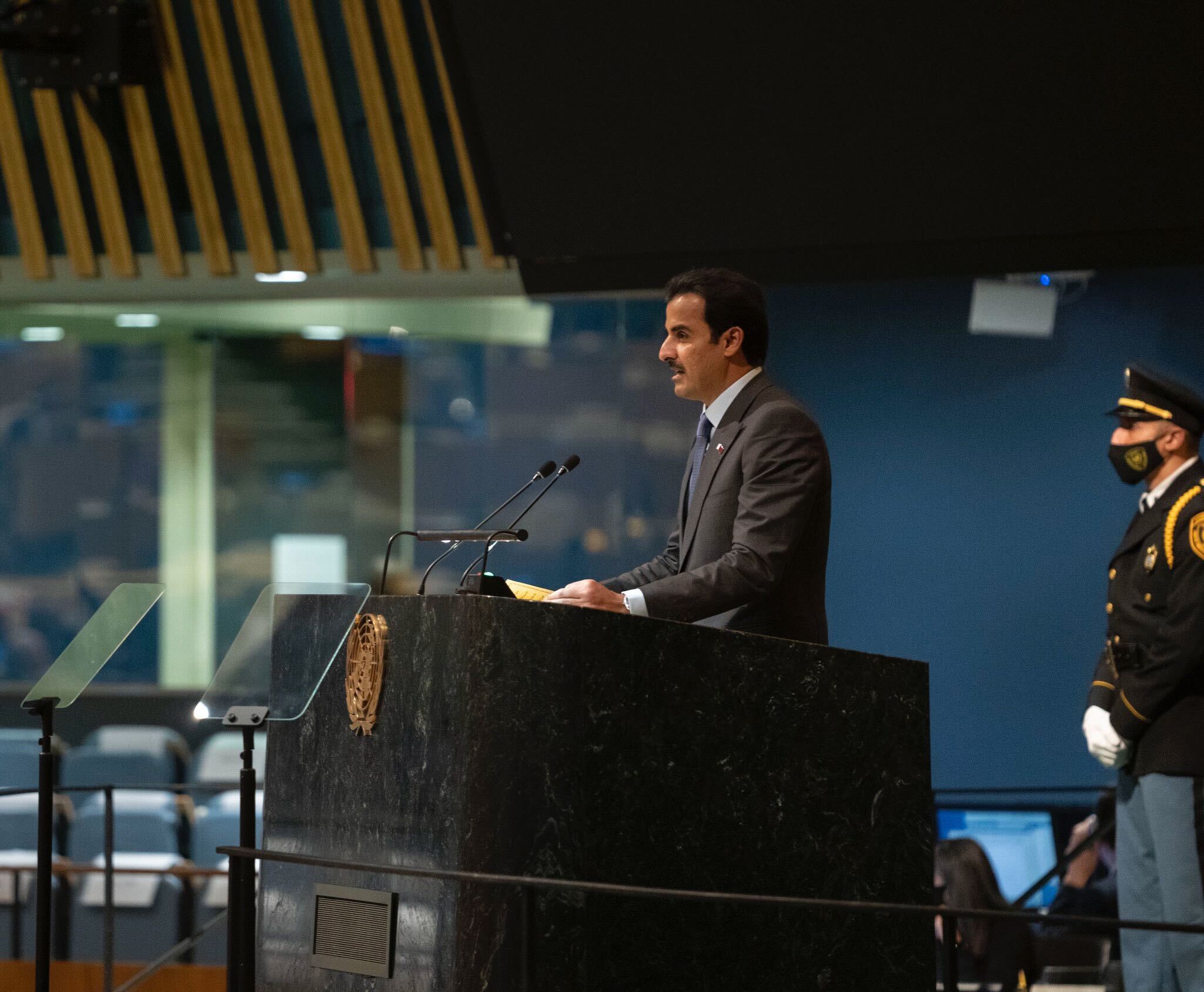Last year, Qatar’s amir spotlighted a range of regional issues on the global stage.
Qatar’s amir touched down in New York on Sunday to attend this year’s annual United Nations General Assembly (UNGA), where world leaders are set to convene to take on the most pressing global issues.
Sheikh Tamim bin Hamad Al Thani is accompanied by an official Qatari delegation for the flagship event, due to start on 18 September, according to the Amiri Diwan.
Last year, Sheikh Tamim delivered an impassioned speech at the UNGA and highlighted key issues concerning the Middle East region and beyond while also taking aim at the perceived polarisation in addressing them.
“Whether the belief is that the world is unipolar or multipolar, international politics is still run in accordance with the rationale of countries that own varying capabilities, interests and priorities, and not in line with the logic of one world and one humanity,” said Amir Tamim.
With the Palestinian cause remaining a core element of Qatar’s foreign policy, Amir Tamim renewed the need to implement international resolutions and press Israel to end its illegal occupation.
“The Palestinian cause is still unresolved, and in light of the failure to implement the resolutions of international legitimacy and with the persistent change of facts on the ground the settler occupation has pursued a fait accompli policy,” said Sheikh Tamim.
Amir Tamim dedicated a part of his speech to the unresolved Syrian crisis.
“In our region the international community failed to hold the war criminals in Syria accountable for what they had perpetrated. And in furtherance of the disillusionment, some are seeking to turn the page on the tragedy of the Syrian people,” said the amir.
Sheikh Tamim added that the Syrian crisis represents “an important lesson regarding the consequences of the absence of a long-term vision from the active forces of the international community”.
The Qatari leader urged a need to address the concerns and respond to the plight of the Syrian people, including millions of refugees who have been forced out of their homes during the decade-long conflict.
“We must pay attention to the roots of the issues before their impacts knock on the doors of our countries,” said the amir.
Sheikh Tamim also touched on issues in Libya, Yemen the Iran nuclear deal, Afghanistan and the global energy crisis.
The Qatari leader added that the current global realities “depict a bleak image of the future of humanity”, stressing the importance of dialogue and joint action to face such crises.
“Each of us has a role to play, and what seems impossible today may become an achievable reality when there is a vision, will and good intentions,” said the amir.
Qatar relations with the United Nations
Over the years, Qatar has become increasingly visible in UN-led efforts to resolve crises, uphold peace, and prevent conflicts.
It has notably contributed troops to various UN peacekeeping missions, reaffirming its commitment to international stability.
Since becoming a member in 1971, Qatar has been an active participant in achieving the UN’s aims. These encompass the maintenance of global peace and security, the promotion of human rights, and collaborative efforts to tackle international challenges.
The Gulf state also gained recognition for its efforts in protecting vulnerable societal groups, notably children. In May 2020, the UNGA adopted a resolution to designate 9 September as the “International Day to Protect Education from Attack”.
Spearheaded by Sheikha Moza bint Nasser, Chairperson of Education Above All Foundation, the resolution aims to generate international accountability for attacks on education and violence against children.
Co-sponsored by 57 Member States, the international day serves as an annual review platform for commitments to safeguard educational institutions.
Meanwhile, Arab issues have consistently been a central concern for Qatar within the UN framework. Qatar has been particularly vocal in addressing the question of Palestine and has submitted numerous draft resolutions.
In 2016, amid escalating violence in Syria, Qatar, in collaboration with the Principality of Liechtenstein, successfully introduced a UNGA resolution that established an independent mechanism for investigating and prosecuting severe crimes in the war-torn country, as categorised under international law.
On the issue of international peace and security, Qatar has continuously advocated for a Middle East free of nuclear weapons, considered a crucial step towards global nuclear disarmament.







